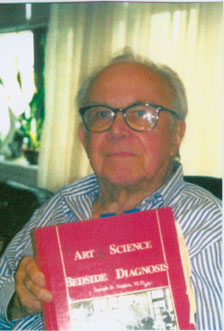Campbell Moses
Year: March 19th, 2002
Location: New York City
Interviewed by: Blackburn, Henry
Abstract
Cam Moses was a colorful and much loved or despised Medical Director of the American Heart Association for the 60 and 70s. Here he discusses his career in physiology and pathology and many engaging and revealing stories about friends and colleagues. He talks about his start during wartime at the University of Pittsburgh, working in animal labs, keeping up with clinical practice and teaching in the medical school. Moses recounts in detail his experiences at the American Heart Association and the Association’s evolution. He is eloquent on the importance of physicians’ listening, and discusses his forthcoming book, “Listening to Patients.” (Suzanne Fisher).
Quotes
On Meeting “Mr. Cholesterol”
At the first meeting I came to [of the Society for the Study of Atherosclerosis], I got in about 10:00 one night, and who’s checking in ahead of me? Ancel Keys. I didn’t even know the name Ancel Keys. So I introduced myself and we talked a little bit. He said he was going to eat afterwards. I said, “Yeah, I haven’t eaten yet.” So we went across the street to the Drake Hotel. There was a really good restaurant there. I forget the name of it. He sat down and ordered a steak rare with an egg on top. (2)
Beginnings
During the war, everybody in medical school belonged to ROTC. After two years in medical school you took a physical and then were eligible to go on active duty and pick up some scholarship money. I was turned down for “chronic sinusitis and partial color-blindness.” The dean got word of it and called me in during my senior year. He said, “Moses, I’ve lost four people in physiology and biochemistry and I hear you got turned down for the Army. I want you to become a physiologist.” That’s how I got started. (5)
In 1948 when the Heart Association had its meeting in Cleveland, that was when hypertension began to be an issue. It was at that meeting that Paul White turned me on. I had never met Paul White, but he gave a talk in which he said, “Atherosclerosis is too important to leave to doctors. We’ve got to get the public involved.” He was an eloquent little guy. Later I got to know him real well. I was Medical Director for the Heart Association from ’67-’73 before I was fired. And I was fired. (12)
On Being Fired as Medical Director of AHA
That was sort of curious. It was pretty much to do with the guy who was chairman of the A.H.A. board at that time. A guy from Cincinnati who was moving the Heart Association to “management by objective.” Remember that?
Unbelievable. So he wanted me to put the AHA research program on “management by objective.” I had a big meeting with lots of people. He said, “Look how they got to the moon.” I said, “But we knew where the moon was.”
And that was the moment I lost my job. I didn’t know I had lost my job for a few weeks after that. But I had. And Moore came in and he threw me the coup de grace. They were just dumb. I shudder now what they’re doing. And selling their logo! (17)
Tales of Paul Dudley White
When I was at the Heart Association I once got a call from the [New York City] police. They had picked up a guy riding a bicycle across the 59th St. Bridge. “He seems like a nice old man, knows where he’s going. He’s got tickets for an airplane at LaGuardia. It’s a folding bicycle.” And the cop picked him up and escorted him to the airport.
Another really good story shows the kind of person he [White] was. First year I was at the Heart Association, Lew January was the President, I think, we have an appointment with Dr. White in Boston at 10:00 on morning to find out what the hell to talk about. We walk in to his little unpretentious office with loads of daffodils all around. His secretary who is about his age said, “He’ll be out in a few minutes.” He came out with this older couple who were at least 75 and said to his secretary, “Give him an appointment in six years.” That was the nicest thing anyone could say. (28)
Full Transcript Access
Full transcripts of interviews may be made available to those engaged with original materials for scholarly studies by contacting us.
